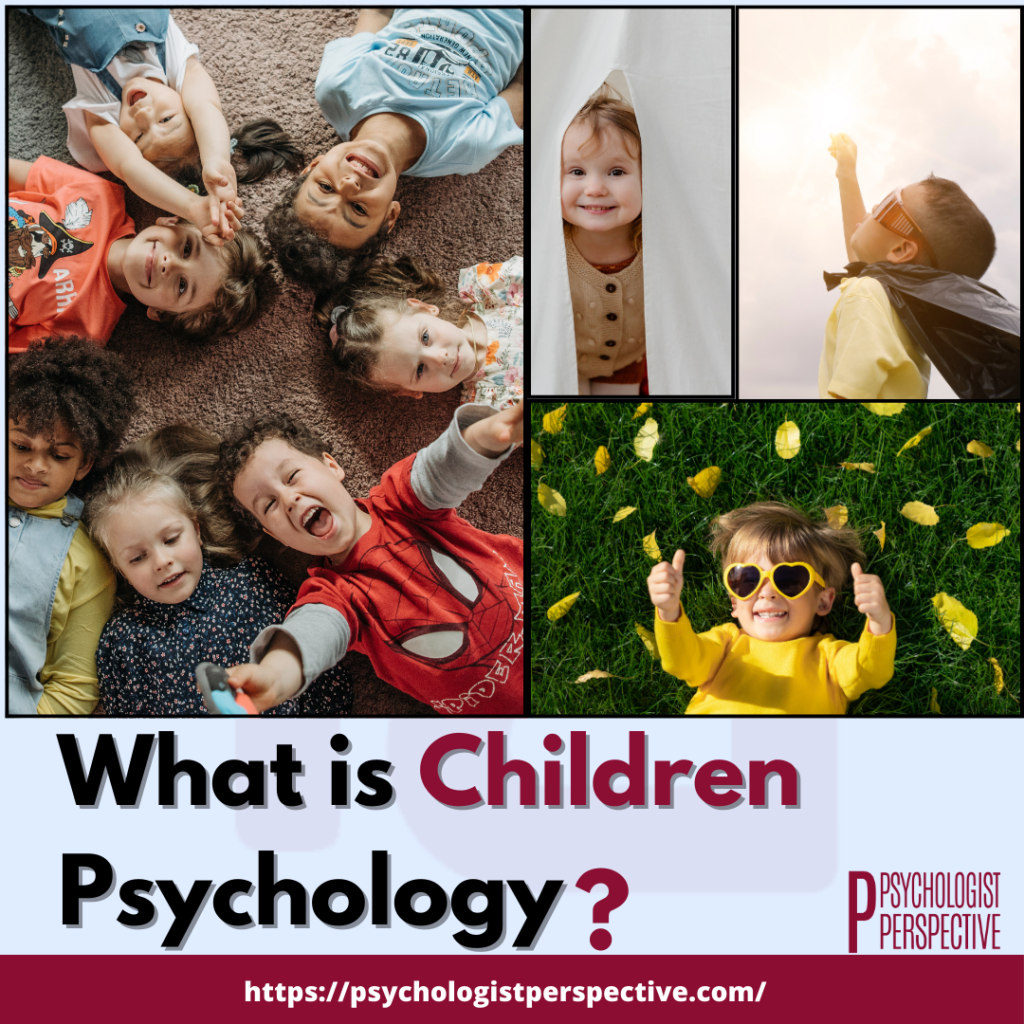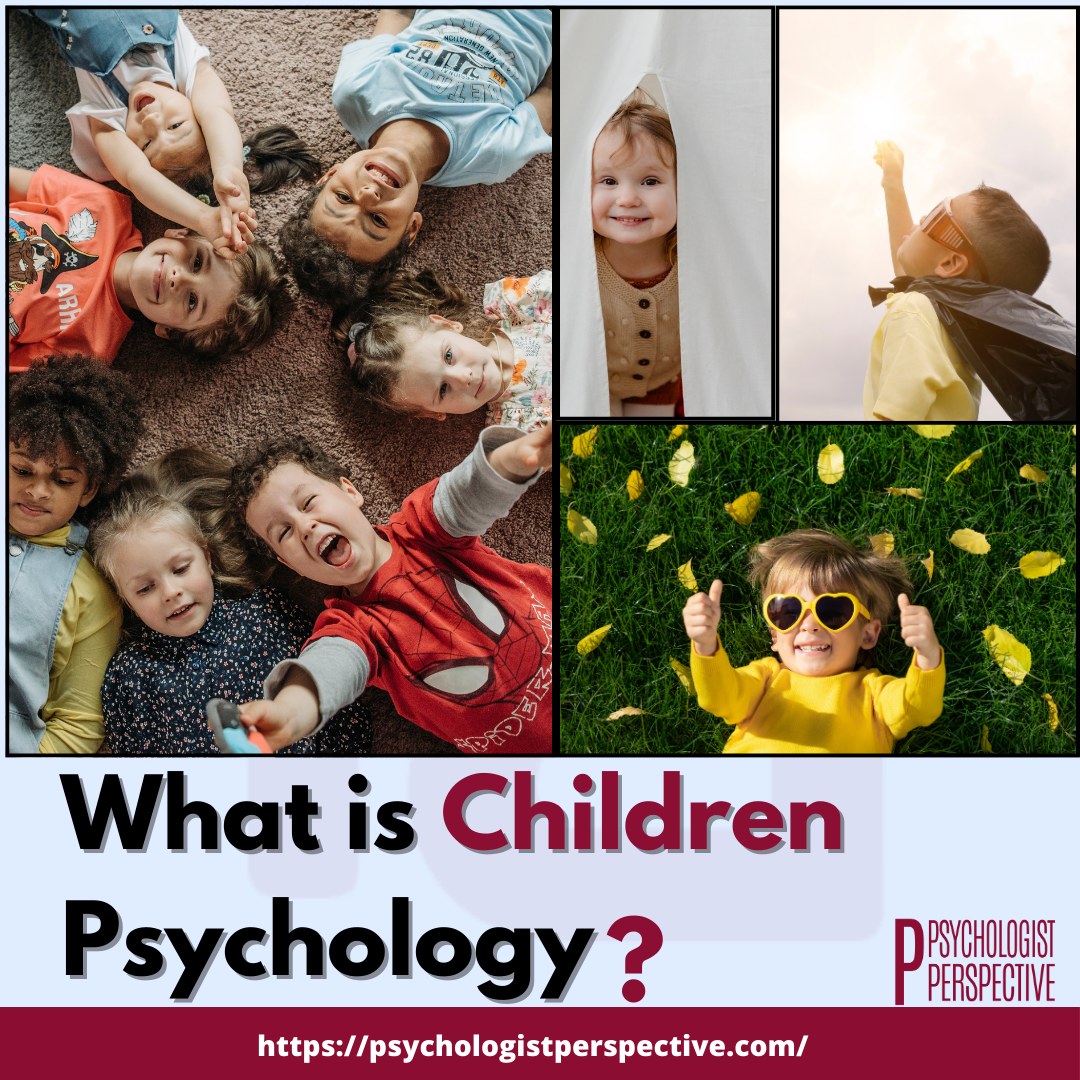What is Children Psychology? -Definitions, Importance, Development, Careers
Psychology is a big area of study about how people behave. Children psychology is one part of it that looks at how kids grow and change. It starts with babies and goes all the way to when they’re grown-ups. Talking to kids and understanding them can be tricky. That’s why children psychology is important. It helps us figure out why kids act the way they do and how they learn. Children psychologists watch and learn from kids to understand their feelings, thoughts, and how they get along with others. There’s a lot to learn in children psychology, but it helps us understand kids better and how they grow up.
Perspectives on Children Psychology: Definitions from Different Authors and Psychologists
Jean Piaget:
Piaget (father of child psychology), emphasized the cognitive aspects of child psychology. He defined child psychology as:
“The study of the mental processes and behaviors of children as they interact with their environment, focusing on how they construct knowledge and make sense of the world.”
Lev Vygotsky:
Vygotsky’s perspective on child psychology emphasizes the social and cultural influences on development. He described child psychology as:
“The study of how children’s minds are shaped by social interactions, cultural practices, and language.”
Erik Erikson:
Erikson’s psychosocial theory underscores the importance of social relationships and identity formation in child development. He defined child psychology as:
“The study of how children navigate various psychosocial challenges and develop a sense of self and purpose.”
John Bowlby:
Bowlby’s attachment theory emphasizes the significance of early caregiver-child relationships in shaping later development. He viewed child psychology as:
“The study of how attachment patterns form and influence emotional and social functioning across the lifespan.”
Urie Bronfenbrenner:
Bronfenbrenner’s ecological systems theory emphasizes the impact of multiple environmental influences on child development. He defined child psychology as:
“The study of how children are influenced by their immediate and broader social contexts, including family, school, community, and culture.”
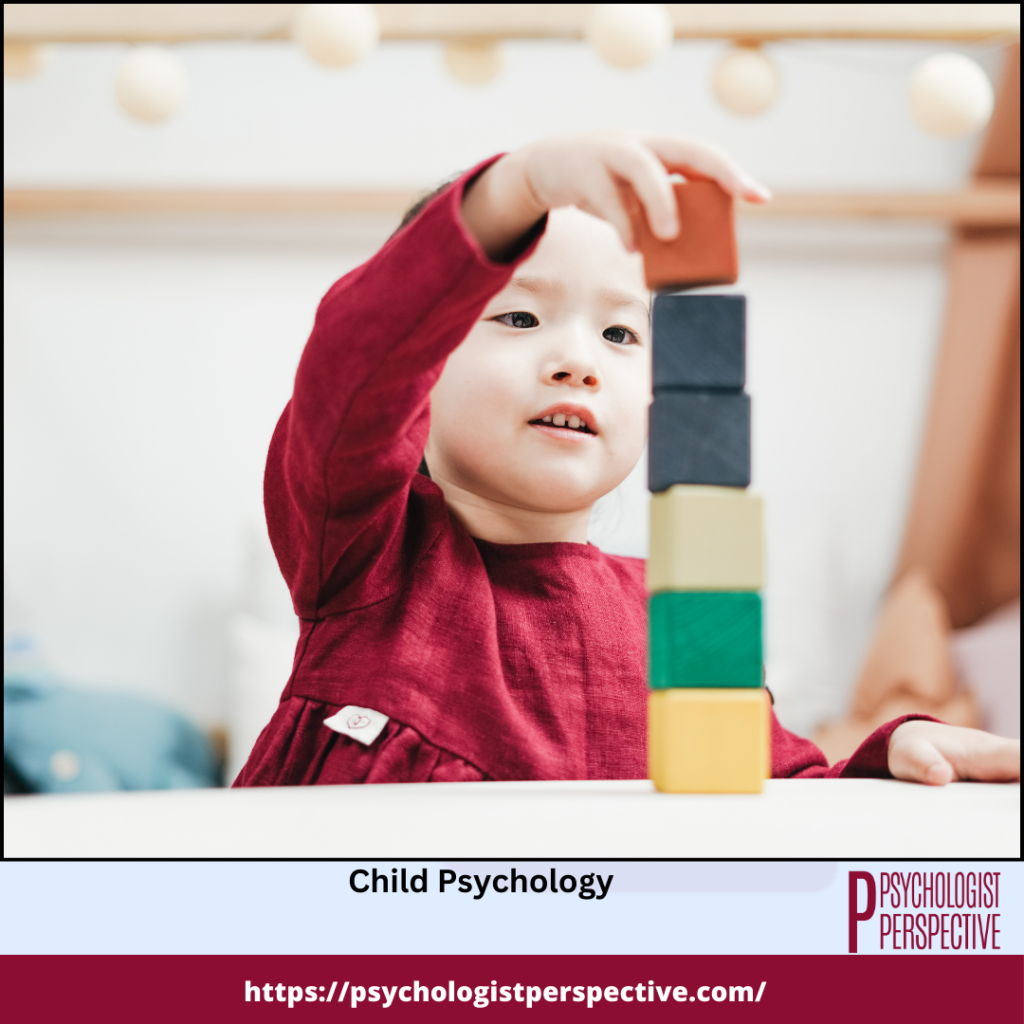
Importance of Children Psychology:
You might be wondering why we need psychology for children, especially when they seem carefree and playful. Sometimes, parents think their kids’ odd behavior or struggles with schoolwork are just them being mischievous. But learning can be tough for kids, and parents might misinterpret their actions. That’s where children psychology comes in. It helps us understand children better, including their challenges and emotions. So, knowing about children psychology is crucial for parents to support their kids effectively.
1.Understanding Development:
Children psychology provides insights into the physical, cognitive, emotional, and social development of children. This understanding helps parents, educators, and policymakers support children’s growth and well-being.
2.Early Intervention:
Studying children psychology enables early identification and intervention for developmental delays, learning disabilities, behavioral problems, and mental health issues, promoting better outcomes for children.
3.Parenting and Education:
Children psychology research informs parenting practices, teaching strategies, and educational interventions tailored to children’s needs and developmental stages, fostering optimal learning and socio-emotional development.
4.Promoting Mental Health:
By understanding the factors that contribute to children’s mental health and well-being, child psychologists can develop prevention programs, therapeutic interventions, and support services to address psychological challenges and promote resilience.
5.Informing Policy and Advocacy:
Children psychology research contributes to evidence-based policies and advocacy efforts aimed at improving children’s rights, access to quality healthcare, education, and social services, advocating for policies that support healthy development and protect children from harm.
In summary, child psychology encompasses the study of children’s psychological development and behavior, drawing from various theoretical perspectives and research methodologies to understand and support children’s well-being and optimal development.
12 Major areas covered by Children Psychology:
Children Psychology encompass a wide range of topics and research interests, aiming to enhance our understanding of children’s lives and promote their healthy development and well-being. Let’s dig in into the 12 major areas covered by children psychology:
1.Cognitive Development:
Understanding how children think, learn, reason, and problem-solve at different ages and stages of development.
2.Emotional Development:
Exploring the development of emotions, emotional regulation, empathy, and social skills in children.
3.Social Development:
Studying how children form relationships, interact with peers and adults, and navigate social situations.
4.Language Development:
Investigating the acquisition of language, communication skills, and language disorders in children.
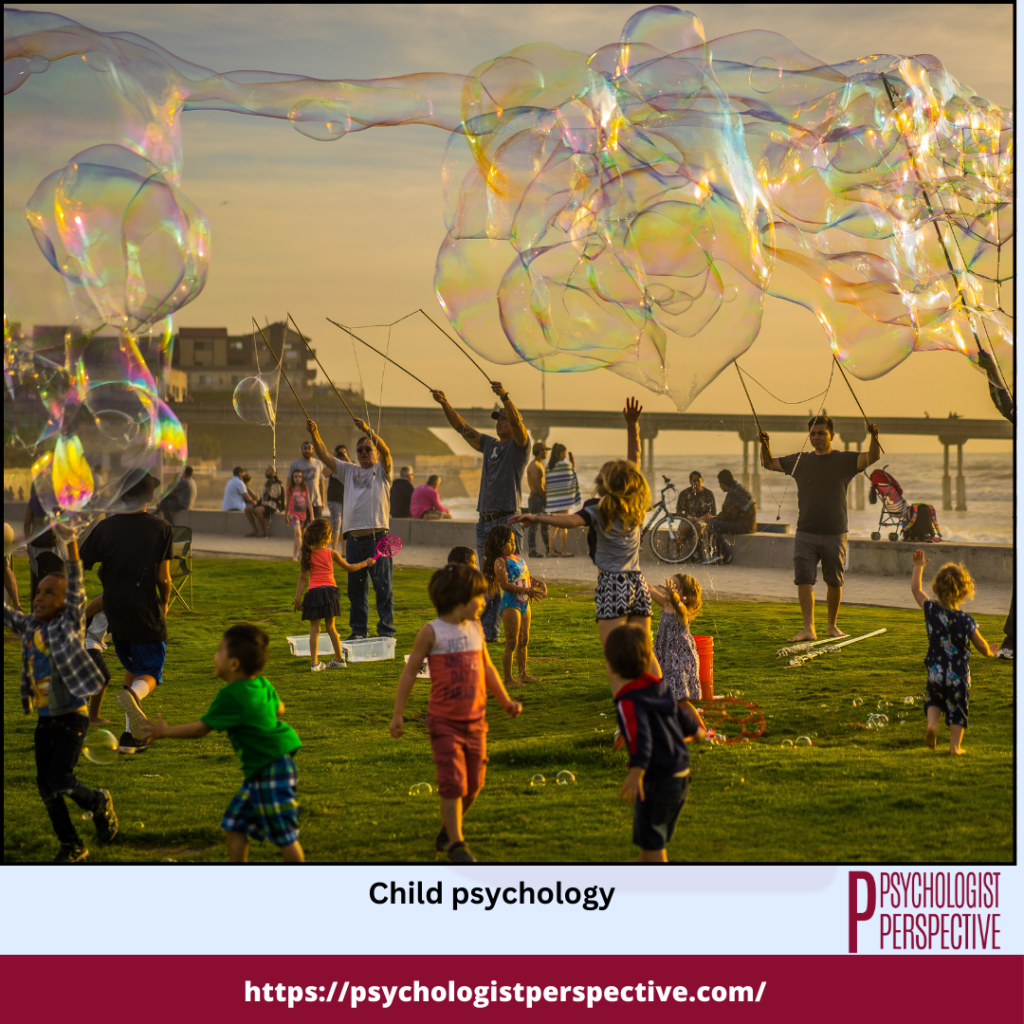
5.Personality Development:
Examining the development of personality traits, temperament, and self-concept in children.
6.Moral Development:
Exploring the formation of moral reasoning, values, and ethical decision-making in children.
7.Attachment and Parent-Child Relationships:
Understanding the importance of early attachment relationships and the impact of caregiver-child interactions on development.
8.Psychopathology and Disorders:
Identifying and treating psychological disorders and mental health issues in children, such as anxiety, depression , ADHD, and autism spectrum disorders.
9.Education and Learning:
Applying psychological principles to improve teaching methods, curriculum design, and educational interventions for children.
10.Family Dynamics and Parenting:
Examining the influence of family environment, parenting styles, and family dynamics on child development and behavior.
“Before playing with his equals, the child is influenced by his parents.” {JEAN PIAGET)
11.Culture and Diversity:
Considering how cultural factors, societal norms, and diversity influence children’s development and experiences.
12.Intervention and Therapy:
Developing and implementing interventions, therapies, and support services to address developmental challenges, behavioral issues, and mental health concerns in children.
Career Paths in Children Psychology:
A career in child psychology offers a rewarding opportunity to make a positive impact on the lives of children and families. Here are TOP 8 potential career paths within child psychology:
1.Clinical Child Psychologist:
Clinical child psychologists assess and treat children with psychological, emotional, and behavioral disorders. They may work in private practice, hospitals, mental health clinics, or schools, providing therapy, counseling, and diagnostic services to children and families.
2.School Psychologist:
School psychologists work in educational settings to support students’ academic achievement and social-emotional well-being. They conduct assessments, provide counseling and interventions, and collaborate with teachers, parents, and administrators to create a supportive learning environment.
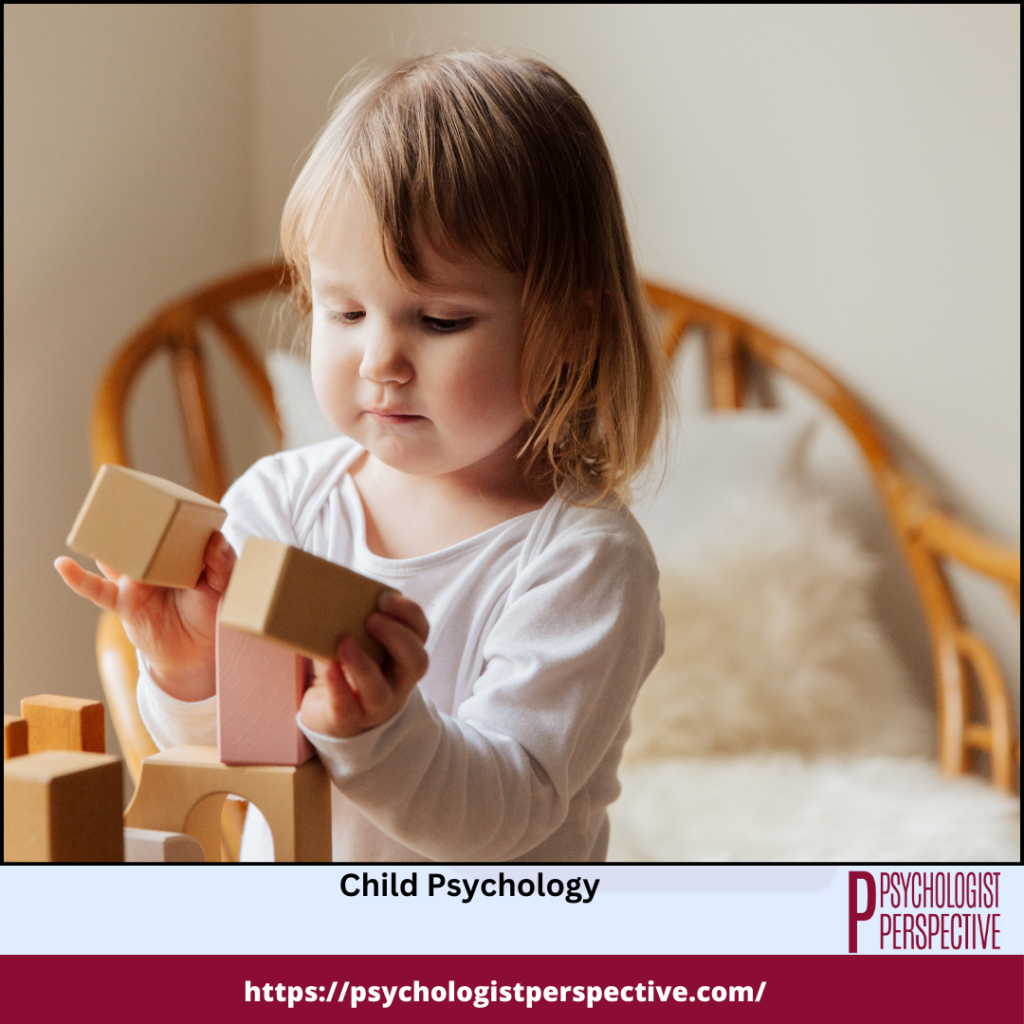
3.Developmental Psychologist:
Developmental psychologists study the psychological development of children from infancy through adolescence. They may conduct research on topics such as cognitive development, socialization, language acquisition, and emotional development, working in academic or research settings.
4.Child Clinical Neuropsychologist:
Neuropsychologists specialize in assessing and treating children with neurological conditions or brain injuries that affect cognitive functioning and behavior. They use neuropsychological assessments to understand brain-behavior relationships and develop intervention plans.
5.Child Therapist/Counselor:
Child therapists or counselors provide psychotherapy and counseling services to children and adolescents experiencing emotional, behavioral, or mental health issues. They may work in private practice, community mental health centers, schools, or residential treatment facilities.
6.Pediatric Psychologist:
Pediatric psychologists work with children who have chronic medical conditions or physical disabilities, helping them cope with the emotional and psychological aspects of their illness or treatment. They may collaborate with medical teams to provide comprehensive care to pediatric patients and their families.
7.Forensic Child Psychologist:
Forensic psychologists specialize in applying psychological principles to legal issues and the justice system. Forensic child psychologists may assess children involved in legal cases, such as victims or witnesses of abuse, and provide expert testimony in court.
8.Researcher/Academician:
Child psychologists can pursue careers in research and academia, conducting studies on child development, psychopathology, interventions, and treatment outcomes. They may work in universities, research institutes, or government agencies, publishing findings in academic journals and contributing to the advancement of knowledge in the field.
These are just a few examples of the diverse career opportunities available in child psychology. Depending on their interests, training, and experience, professionals in this field can specialize in various areas and settings to promote the well-being and mental health of children and families.
